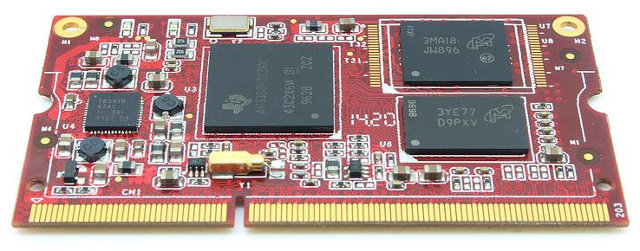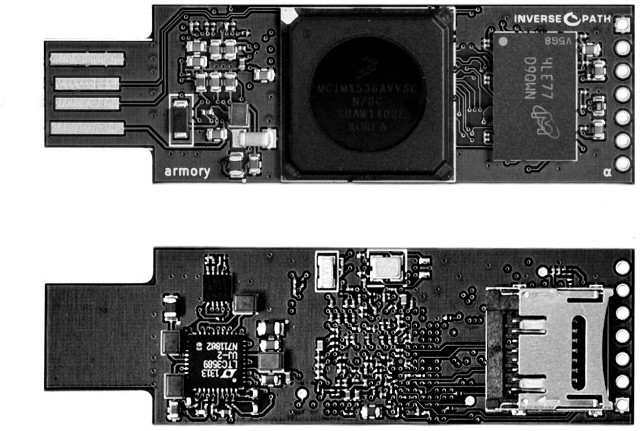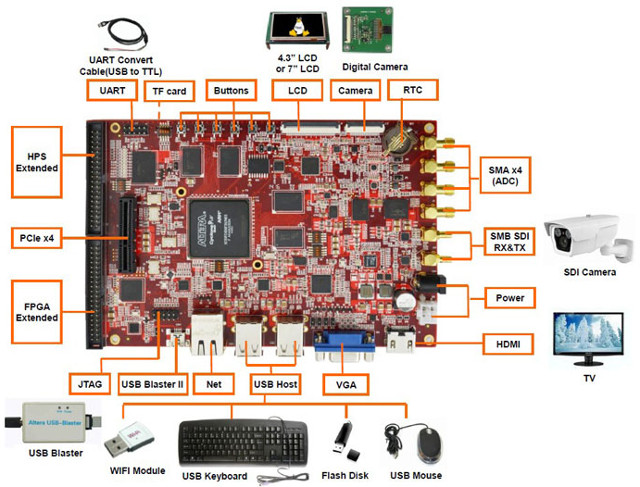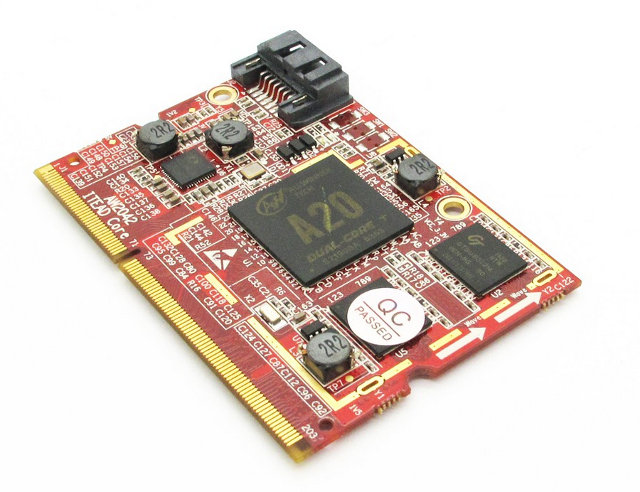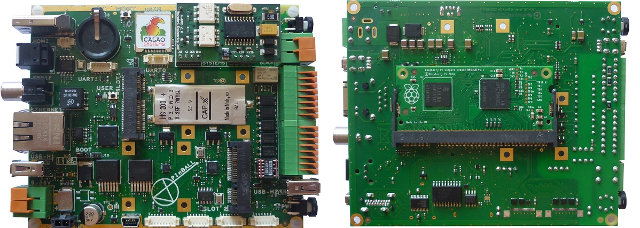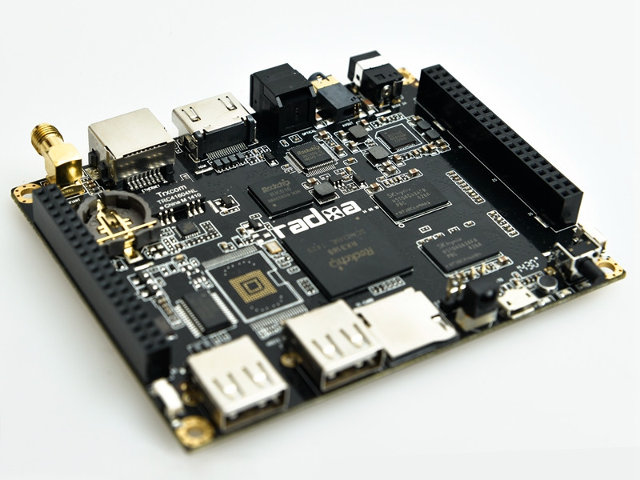GOEMBED is a startup funded by engineers previously working for Embest Shenzhen, based in Longhua district in Shenzhen, and specialized in embedded boards and modules. They currently have board and modules based on Freescale i.MX6 and Texas Instruments Sitara processors, but I’ll focus on the TI products in this post, including one of their single board computers that supports BeagleBone capes. CM3352 and CM3358 Systems-on-Module CM335x Series modules specifications: SoC – Texas Instruments Sitara Cortex A8 AM3352 @ 800 Mhz or AM3358 @ 1.0 GHz System Memory – 512 MB Micron DDR3 chip Storage – 2 to 4 GB eMMC depending on model PMU – TI TPS65910A3 Dimensions – 67.5 x 36.5 mm Temperature Range – Commercial: 0° to 70° C or Industrial: -40° to 85° C The modules are said to support Linux 3.x, Android 4.x, Ubuntu, Angstrom, Debian, WinCE 6.0/7.0, and uCOS operating systems. SBC335x Single Board Computers […]
Linaro 14.10 Release with Kernel 3.17 and Android 4.4.4, Debian ARM64 Port Almost Complete
Linaro 14.10 has just been released with Linux kernel 3.17 (baseline), Linux 3.10.54 & 3.14.19 (LSK, same versions as last month), and Android 4.4.2 & 4.4.4. Most of the work is a continuation of previous months working member hardware, and ARM64, but one particularly interesting point is that 90% of Debian packages have been built for ARM64, and the next version of Debian should have an official ARM64 port. Here are the highlights of this release: Linux Linaro 3.17-2014.10 updated linaro-android topic. In particular, CONFIG_IPV6=y is no longer the requirement for linux-linaro tree builds GATOR version 5.19 (same version as in 2014.08 release). gatord is fixed to build for ARMv8. dropped multi_pmu_v2 topic by ARM LT (no longer used) updated topic from Qualcomm LT (include IFC6410 board support) replaced integration-linaro-vexpress topic by integration-linaro-vexpress64. Starting from 2014.10 release, linux-linaro kernel tree will use the mainline support for 32-bit vexpress boards. integration-linaro-vexpress64 […]
Banana Pro Allwinner A20 Development Board Looks Similar to Raspberry Pi Model B+
Banana Pi development board was launched about half year ago with Raspberry Pi model B form factor, but with more powerful Allwinner A20 dual core processor, and extra interfaces such as SATA. A few months later, the Raspberry Pi foundation launched Raspberry Pi Model B+ with pretty much the same specifications, but a different board layout and connector placement, and LeMaker has now designed a new version of the AllWinner A20 development board called “Banana Pro” that’s somewhat similar to R-Pi B+ board layout, with a 40-pin header, and similar connector placement, minus a few differences, such as using two USB ports instead of four, and the addition of a Wi-Fi module. Banana Pro specifications with differences against Banana Pi highlighted in bold: SoC- Allwinner A20 dual core Cortex A7 processor @ 1 GHz with Mali-400MP2 GPU System Memory – 1 GB DDR3 Storage – micro SD card slot, SATA […]
USB Armory is an Open Source Hardware Freescale i.MX53 Dongle for Security Applications
Most computers-on-a-stick come with an HDMI port, and a few USB ports, but Inverse Path’s dongle is quite different. USB Armory is a flash drive sized computer powered by Freescale i.MX53 Cortex A8 processor with only a USB port and a micro SD slot, that targets security applications such as mass storage devices with automatic encryption, virus scanning, host authentication and data self-destruct, VPN routers, electronic wallets, password managers, portable penetration testing platforms, and so on. USB Armory specifications: SoC – Freescale i.MX53 ARM Cortex-A8 @ 800Mhz with ARM TrustZone System Memory – 512MB DDR3 RAM Storage – microSD card slot USB – 1x USB host port. USB device emulation: CDC Ethernet, mass storage, HID, etc. Expansion Header – 5-pin breakout header with GPIOs and UART Misc – customizable LED, including secure mode detection Power – 5V via USB (<500 mA power consumption) Dimensions – 65 x 19 x 6 […]
Lark Board Powered by Altera Cyclone V SX ARM Cortex A9 + FPGA SoC
Farnell/Element14 has quietly announced Lark Board from their subsidiary Embest Technology in September. The board is powered by an Altera Cyclone V ARM Cortex-A9 dual-core + FPGA processor with high speed transceivers, runs Debian 7.4, and targets medical instruments, video surveillance and industrial control applications. Lark board specifications: SoC – Altera Cyclone V SX (5CSXFC6D6F31I7N) with a dual core Cortex A9 processor (HPS – Hard Processor System) @ 800 MHz, FPGA fabric including up to 110K logic cells (LE), and high speed transceivers (2 PCIe hard IPs and 9 3Gbps transceivers) System Memory – 1GB DDR3 SDRAM for HPS, 1GB DDR3 SDRAM for FPGA Storage – 4GB eMMC Flash + micro SD card slot Audio/Video Interfaces – HDMI, VGA, and 24-bit LCD interface supporting 4-wire touch screen Data Transfer Interfaces: High-resolution serial digital interface (SDI) that supports SMD standard interface and provides a SDI TX and a SDI RX 12-bit […]
ITEAD Core AW204X AllWinner A20 SoM and Core EVB Baseboard
ITEAD Studio has been making systems-on-module based on Allwinner processors for a little while which are found in the company’s IBOX mini PC, MOD Duo guitar pedal, and more. They’ve now launched a new system-on-module with a 204-pin SO-DIMM connector instead of the headers used in the earlier modules. ITEAD Core AW2041 / AW2042 SoM specifications: SoC- AllWinner A20 dual core ARM Cortex-A7 @ 1 GHz + ARM Mali 400 MP2 System Memory – 1 or 2 GB DDR3 RAM (AW2014: 1GB, AW2042: 2GB). Storage – 4GB NAND Flash, micro SD card slot (on the back), SATA connector. Connector – 204-pin SO-DIMM edge connector with UART, I2C, SPI, LCD, I2S, LVDS, GPIO, etc.. signals Misc – Built-in RTC, reset, FEL and power buttons. Power – 5V supply, 3.3V I/Os. AXP209 PMIC. Dimensions – 67.60 x 48.25 x 1.6 mm Weight – 35 grams Temperature Range – Commercial To facilitate development, the […]
CALAO Systems Introduces PInBALL Industrial Board Based on Raspberry Pi Compute Module
CALAO Systems has just launched an industrial single board computer (SBC) for professional Raspberry Pi developers called PiNBALL or, if you prefer, PAC-1210-S200-B2835-EXX…. The board is powered by the Raspberry Pi Compute Module, features interfaces such as two mini PCIe slots (for USB, I2C, GPIOs,…), fast Ethernet, HDMI, opto-isolated inputs and outputs, etc., +6 to +36V power input, and can operate in -20°C to +70°C temperature range. PInBALL industrial SBC specifications (Items marker with ‘*’ are optional, and depend on model): SoC / Memory / Storage – Via Raspberry Pi Compute Module – Broadcom BCM2835, 512MB RAM, 4GB eMMC Flash. Other Storage – 1x 2Kb I²C EEPROM with EUI-48 MAC Address & 128 bit Serial Number (AT24MAC402). Video Output – 1x HDMI Out, 1x CVBS Out (BCM2835) Audio Output – 1x HDMI, 2x S/PDIF Out / Optical & RCA (WM8804), Connectivity – 1x Fast Ethernet (LAN9514), 1x Micro-SIM Socket USB […]
The New Radxa Rock Lite Rockchip RK3188 Development Board Sells for $59
You may have heard about Radxa Rock Lite development board before, so let’s clear up the different versions of the Radxa Rock first. There’s a total of four Radxa Rock models: Radxa Rock (2013) – The original version with 2GB RAM, 8GB NAND Flash, and Wi-Fi/Bluetooth Radxa Rock Lite (2013) – 1GB RAM, 4GB NAND Flash, and Wi-Fi only Radxa Rock Pro (2014) – An evolution of the Radxa Rock still with 2GB RAM, 8GB NAND flash, Wi-Fi/Bluetooth but adding LVDS and camera interfaces. Radxa Rock Lite (2014) – 1GB RAM, no NAND flash, and Wi-Fi only The fist two versions appear to have been phased out, as they are not listed for sale on Radxa Rock website, and today, I’ll write about Radxa Rock Lite (2014). Radxa Rock Lite (2014) specifications: SoC – Rockchip RK3188 ARM Cortex-A9 quad core @ 1.6Ghz + Mali-400 MP4 GPU System Memory – 1GB […]


